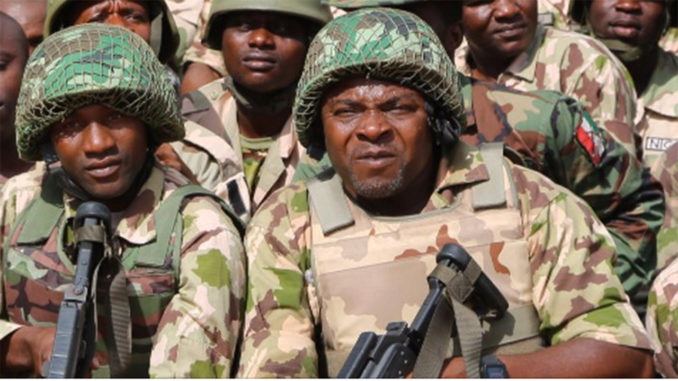
The Nigerian Army on Sunday, 5th January carried out a premeditated siege on the premises of Daily Trust offices across the country. At the Maiduguri office of the newspaper, the regional editor Uthman Abubakar and a reporter Ibrahim Sawab were arrested by soldiers while premises of the newspaper located in Maiduguri, Abuja, Kaduna and Lagos were also invaded on account of allegation of complicity in the ongoing war against Boko Haram in the Northeast.
The invasion of the newspaper’s offices was most unwarranted unfortunate and condemnable.It should be disturbing enough that armed soldiers could be deployed to forcibly take over premises of national daily newspaper on allegation that calls for thorough investigation. Indeed, it is a gross violation of press freedom and signposts gradual descent into authoritarianism, which is a sad reminder of the dark days of military rule.
Notwithstanding the difficult challenge the military has been facing in the prosecution of the war against Boko Haram terrorists, it is nevertheless lamentable that the authorities of the Nigerian Army appear to be gradually losing touch with the responsibility of enhancing civil-military relation; particularly with the media with the view to guaranteeing trust and confidence in combating the security situation in Nigeria. Coming shortly after threat by the Nigerian Army to close offices of Amnesty International in the country, the invasion of Daily Trust clearly depicts lack of proper approach to handling grievances in a democratic setting. We are particularly concerned that such unbridled highhandedness against the Fourth Estate of Realm has further accentuated ugly commentaries on the growing lawlessness that is gaining ascendancy amongst security agencies in Nigeria.
Contrary to initial suggestion that the raids by the soldiers were sparked off by the lead story published the same day by the newspaper with respect to military operations in the Northeast, the authorities of the Nigerian Army have since alleged that the newspaper undermined national security by divulging classified military information to terrorists. In a statement, the spokesperson of the Nigerian Army, Brigadier General Sani Usman alleged the newspaper disclosed details of planned military operations against Boko Haram terrorists. Why the allegation by the military is weighty,grievous and worrisome, we are however strongly of the view that, beyond mere exhibitionism orchestrated by individuals, the action of Nigerian Army fell short of any serious move aimed at genuinely seeking redress against perceived wrong doings by the Newspaper. It is curious how the military authorities came to the conclusion that Nigerians and the global community would be convinced that such invasion could have been the right and proper response to unravelling such grievous allegation. Such reckless display of crude power against the media which is a constitutionally recognised institution of democracy could not be sufficiently justified considering the existence of channels for seeking appropriate redress.
It is therefore a huge relief that the president promptly waded into the siege on Daily Trust by ordering soldiers out of the premises of the Newspaper. But we are compelled to demand that the president should be deeply interested in the allegation that a national newspaper tipped-off Boko Haram on operations by Nigerian military. Such grievous allegation needs to be substantiated with appropriate actions if the need arises. Otherwise such red-hering, as most likely to be the case, could serve as precedentfor perpetrating future attacks on freedom of the press. Nevertheless, we would expect the President and Commander-in-Chief of the Armed Forces to forestall reoccurrence of such impunity under whatever guise. It is instructive that nothing has so far suggested authorities of the Nigerian Army are interested in proving allegation of wrongdoings against Daily Trust Newspaper. It would then amount to unwarranted and wilful attack on press freedom if the Army, at the end, fails to prove the allegation.
We wish to counsel the military; particularly the Army which has reportedly over time demonstrated penchant for abuse against individuals and institutions to embrace appropriate channels of seeking redress when and if the need arises. Perhaps, the military is yet to fully appreciate that the Nigerian media, in carrying out its responsibility to the society operates within the confines of legally constituted regulatory bodies as well as the Constitution of the Federal Republic of Nigeria. It is therefore expected that any security agency with grievance against any media organisation should seek redress rather than resulting to arm-twisting and self-help.
END

Be the first to comment